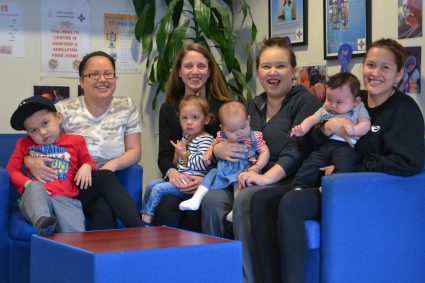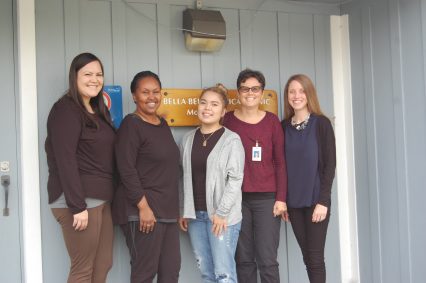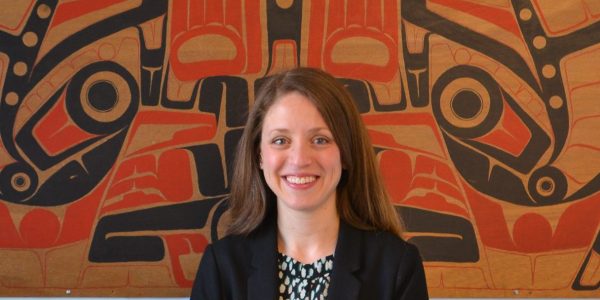Strengthening relationships with clients key for Bella Bella Nurse Practitioner Melissa Housty
Of all the Nurse Practitioners in Vancouver Coastal Health, Melissa Housty works in the rainiest, most remote location – in Bella Bella on the Central Coast. You either fly in or arrive by boat.
And she wouldn’t have it any other way.
“Since returning to work following mat leave, I’ve enjoyed reconnecting with clients and establishing my practice,” says Melissa of working in the tiny Heiltsuk First Nations community. “This has been a rewarding experience both personally and professionally for our family to live and work in a community which we care about deeply.”
Melissa is in her second stint as an NP in Bella Bella. Between 2008 and 2010, Melissa was an NP in the family All Postspractice clinic in Bella Bella, but long-term funding wasn’t secured so she and her husband Gary relocated back to Vancouver where she worked as an NP at the BC Cancer Agency then as a Maternal Child Health – Clinical Nurse Specialist for the First Nations Health Authority.
In 2015, both she and Gary were presented with opportunities to return to Bella Bella, she as a part-time NP and Gary as the Manager of Clinical Services at R.W. Large Memorial Hospital. For Gary, who is a member of the Heiltsuk First Nations, it was a return to his birthplace.
“We were expecting our first child so these opportunities really encouraged us to examine our priorities with regards to work, family, and culture. These new career opportunities aligned with our core values and we relocated to Bella Bella shortly before having our son.”
A typical day
The main focus of Melissa’s practice includes women’s health, prenatal, postpartum, pediatrics and adolescent mental health, but she is also expanding her practice to incorporate all patient demographics.
“I typically start my day participating in hospital rounds with the Medical Director, local physicians and staff RN,” she says. “Then once a week we host community rounds where we meet with the Hailika’as Heiltsuk Health Centre community health nurses as well any visiting interdisciplinary team members. This enables us to review complex cases and discuss clients who may require follow-up either in community, clinic or emergency department. We are also very fortunate to have several visiting specialists such as cardiology, endocrinology, ENT, nephrology, OBGYN, pediatrics, and ultrasound.”
Melissa also runs a weekly youth sexual health clinic at the local school (Bella Bella Community School) where she provides youth with another point of access for care.

NP Melissa Housty (second from left) sits with clients at the Bella Bella Medical Clinic. Featured here are (l-r) Danya Brown (holding Ryder Hall), Melissa and son Gage, Brittany Hall holding Allisa Reid, and Jaylynn Lucas holding Grady Hall.
Life in a small community
Bella Bella isn’t the tiniest place Melissa has worked in. That would be an outpost nursing station in Pangnirtung, Nunavut, where she worked for a winter with her husband.
Even still, working in an isolated community isn’t for everyone. Melissa does admit to missing the collegial relationship she had with other NPs in Vancouver, but she noted that VCH Professional Practice is helping foster connections among Nurse Practitioners working in Aboriginal communities.
“This will be a meaningful support system for NPs working in similar settings,” she says.
To be happy and fulfilled working in a small community, Melissa says it’s imperative a person have genuine interest in the people, culture, traditions and community as a whole.
“There is a lot of transient healthcare staff, so it is meaningful when providers take a moment to connect with individuals and learn about the community, history and traditions,” she says.
“It is also great to have a sense of adventure, take the opportunity to get out on a boat and go fishing, camping, attend community gatherings, potlatches and feasts, and connect with elders and knowledge holders. This will help enrich the personal experience and also strengthen the relationships created with clients, families and the community.”
Building relationships key to success
Melissa considers the relationships she builds with clients and families, particularly the opportunity to follow women throughout their pregnancy and as they welcome a new baby to their family and community, as a privilege both as healthcare provider and community member.
“Although it is clients who decide whether they are provided with culturally safe care, it is a highlight of my practice when clients feel empowered and engaged by their healthcare encounter,” says Melissa. “I believe it is a reciprocal relationship; the opportunity to engage with clients and their families is impactful for not only myself as a healthcare provider, but also to those who I serve.”

Staff who work with Melissa Housty at the Bella Bella Medical Clinic include (l-r) Trisha Thomas, Dega Hersi, Malarie Dixon, and Rhonda Orobko next to Melissa.

